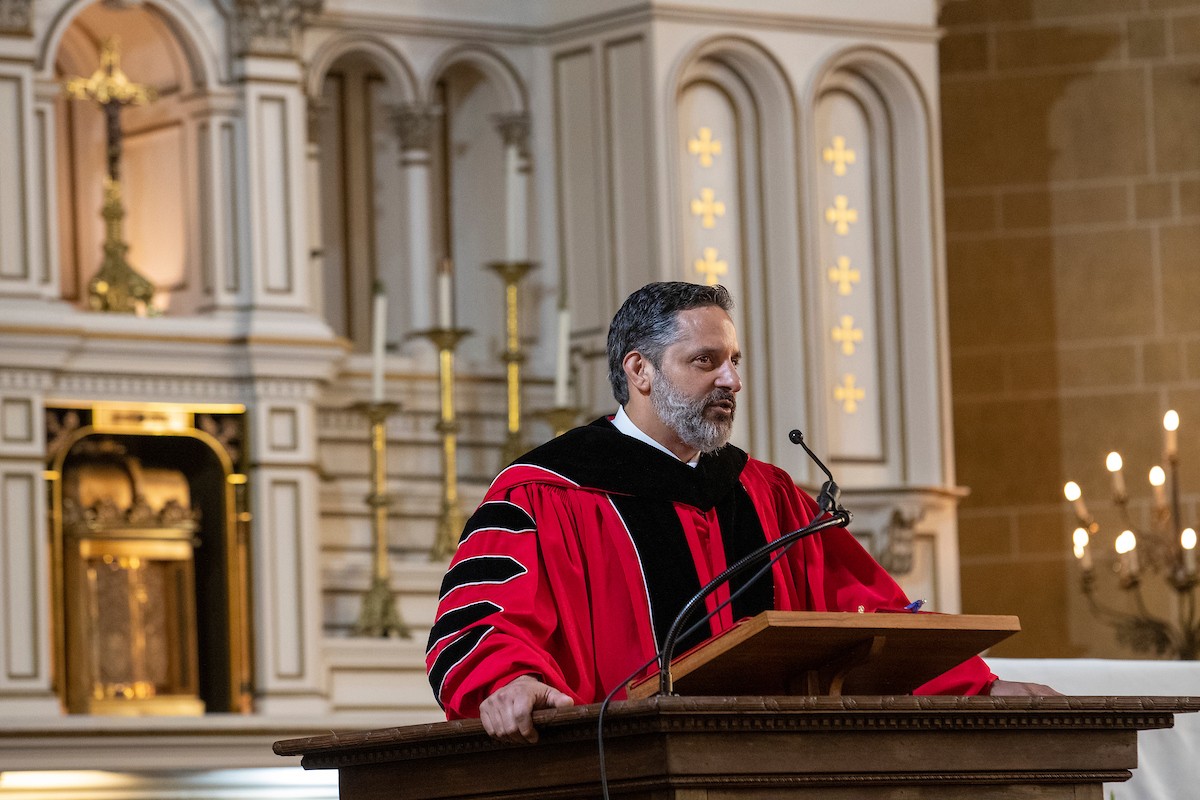No Caption Provided
Photography by Yosef Kalinko
September 29, 2022
Speaking during the Mass of the Holy Spirit, which marks the beginning of SU's academic year, President Peñalver reflected on the readings and how we can unlock the full potential of diversity.
Today’s readings remind us of the beauty and richness of the diversity of gifts that the Holy Spirit brings to our university and to our society.
At Seattle University, we are so accustomed to celebrating diversity that this may seem like a banality.
I want to challenge the seeming familiarity of this message in two respects.
First, we should remember that our own embrace of diversity is not universally shared.
In a 2016 essay, Michael Anton, a White House staffer under President Trump who is now affiliated with Hillsdale College, channeled a significant segment of our polity when he questioned the value of diversity. American diversity is not a strength, he said, but rather a “source of weakness, tension and disunion.”
We should not be surprised that there are many people for whom diversity is something to be feared.
The Spirit of God, and the diversity it unleashes, is unruly and challenging. It pushes us outside of our comfort zone. It makes life less predictable . . . more tumultuous.
But the benefits made possible by that tumult outweigh the discomfort it creates.
Diverse communities and working groups outperform homogeneous ones. They perform better because, collectively, they are more generative. They possess fewer blind spots. They are less prone to errors rooted in the limited perspectives and life experiences of their individual members.
At the same time, social scientists find that when diverse groups do not work together – when they splinter, when members turn on one another – they can fail . . . and do so spectacularly. This is what was happening to the early Christian community in Corinth at the time of Paul’s first letter to them.
In that letter, Paul could not have been clearer, both about the value of diversity and about its centripetal potential.
As Paul observes, the diversity reflected in the Spirit’s gifts is an essential dimension of the common good. Each of the nine gifts he lists in today’s reading is a good thing individually. And, collectively, the diversity of those gifts is also a good thing. That diversity reflects God’s plan for us.
But to unlock the fruits of those gifts, we need to orient them – and ourselves – towards a common good . . . a good we all share, even in our rich diversity.
Each of our diverse gifts has its origin in “the same Spirit,” Paul insists. And it is that shared origin in the one Spirit that provides a foundation for unity amidst our diversity.
To drive this point home, in the closing lines of today’s reading, Paul reminds the Corinthians that “a body, though one, has many parts, but all its many parts [still] form one body.”
And that is how it should be among us, he explains.
So the first way to move beyond the banality of affirming the value of diversity is to acknowledge that some people reject its value, and that they do so because they are too narrowly focused, as Anton was in his 2016 essay, on diversity’s potential to separate us from one another.
That potential is real. But it is only one side of the story. And it is a risk we can overcome if we are attentive to it.
To do that, we need to couple our celebration of diversity with a mutual recognition of the many things we share with one another, the many things that bind us together. Our shared human nature. Our common good.
But to achieve this mutual recognition, we also need to understand and dismantle the obstacles that injustice and intolerance – historical and continuing . . . personal and structural – place in the path of our unity.
The second way I want to push through the familiarity of this message about diversity is to challenge us to think about diversity comprehensively.
What is the scope of our embrace of diversity? Who does it include? What categories and characteristics does it exclude?
The social science that I described earlier is extremely (small “c”) catholic in conceptualizing the varieties of diversity that it finds valuable. Those categories encompass a diversity of identities, to be sure; but they also include a diversity of life experiences – which is not exactly the same thing – a diversity of viewpoints; and (importantly for a comprehensive university) a diversity of fields of study and methodologies.
Viewed through this inclusive lens, every single member of our community has something valuable to contribute to the diversity of Seattle University.
That possibility can only be fully realized if we work to dismantle the attitudes and structures of injustice and intolerance that prevent us from fully recognizing and valuing one another.
And we need to be especially attentive to those diversities that we, as a community, have historically excluded (and continue to exclude) from the scope of our recognition. In this regard, we need to take note of Jesus’s example in today’s gospel, where he launched his public ministry by bringing glad tidings to the poor, liberty to the captives, sight to the blind, and freedom to the oppressed.
As we begin this new academic year, let’s remember to celebrate and welcome the gift of our diversity. Let’s celebrate the broad range of ways in which we are diverse. But at the same time let’s attend to the unity of Spirit that allows us to unlock the full potential of that diversity.

